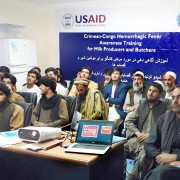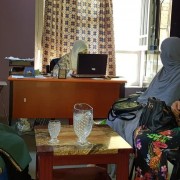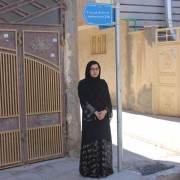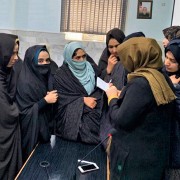Speeches Shim

The Crimean-Congo Hemorrhagic Fever (CCHF) is a viral disease transferred from animals to humans via infected ticks or animal blood, and then from human to human through body fluids. The fatality rate is more than 30 percent in Afghanistan where it spreads rapidly, as most villagers keep livestock in their living quarters and do not understand the related hazards.

Women in Afghanistan have limited access to education. Of the 3.7 million children out of school across the country, 60 percent are girls, according to the latest Survey of the Afghan People. Naraywal* was born in Kunar Province, but she moved to Nangarhar so she could attend a university as there were no higher education institutions in her home province.

At the “Passage to Prosperity: India-Afghanistan International Trade and Investment Show” held September 24 – 26, 2019 in New Delhi, India, the USAID-supported Kabul Carpet Export Center (KCEC) showcased a range of carpets that are made by Afghan manufacturers.

Najia Safdari, a 32-year old mother of two and a small business owner, is the only breadwinner in her family. Her husband died two years ago from stroke. At her factory, Najia processes raw wool and weaves carpets. The lack of a proper addressing system in Herat made it more difficult for Najia to connect with her clients and suppliers, especially in the case of new connections.

In Afghanistan, the judicial entrance exam is the gateway for new judges. However, the exam only took place in Kabul, which meant that students from across Afghanistan were required to travel to Kabul and register for the judicial exam with the Supreme Court. This travel requirement made it even more difficult for female law-trained graduates. According to the Supreme Court Human and Institutional Capacity Development Assessment Report released in December 2016, there were 82 female judges at the Central Supreme Court out of a total of 108 judges. However, there were 62 female judges in Kabul province, out of a total of 249 judges. There were no female judges in Badakhshan, Kapisa, Laghman, Maidan Wardak, Nangarhar, Parwan and Sar-e-Pol provinces.

Comment
Make a general inquiry or suggest an improvement.